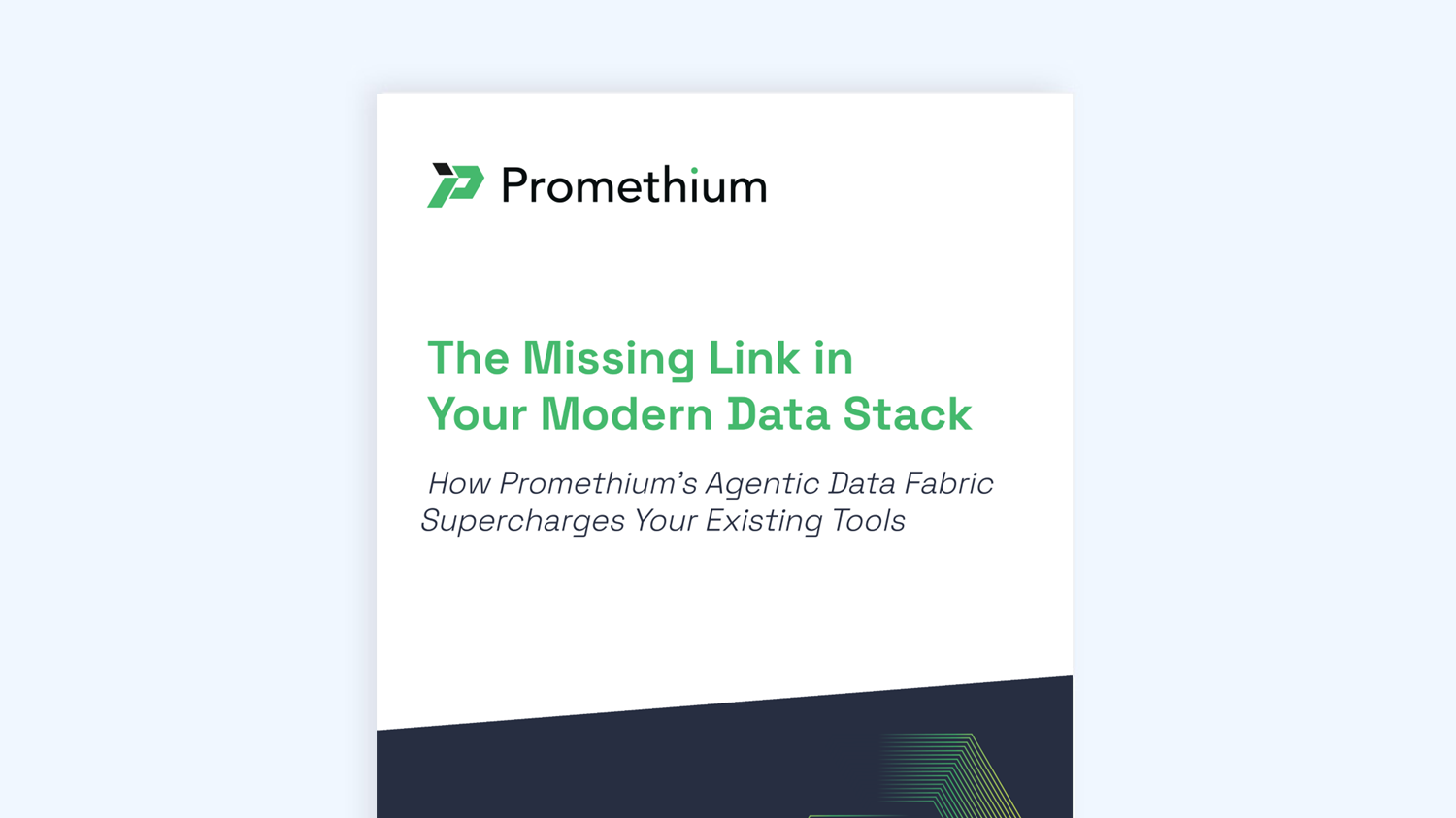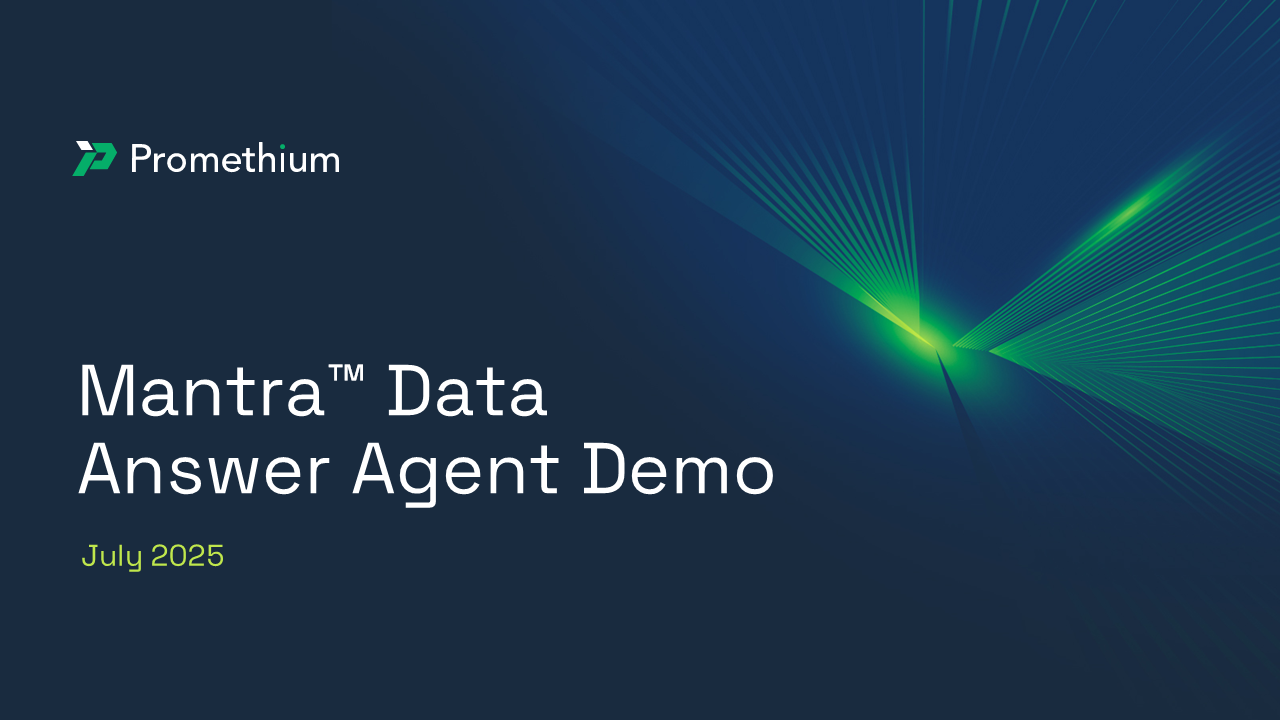Summary Table: Feature-by-Feature Comparison
| Feature | Promethium | Denodo | Best For |
| Platform Generation | ✅ Modern agentic data platform | ⚠️ Legacy data virtualization platform | Promethium (modern AI workflows) |
| User Interface | ✅ AI agent interface with natural language queries | ⚠️ Traditional data catalog and marketplace | Promethium (conversational data access) |
| Query Language | ✅ Standard SQL with federated capabilities | ⚠️ Proprietary VQL (Virtual Query Language) | Promethium (no vendor lock-in) |
| AI & Context Layer | ✅ Native 360° context engine with business intelligence | ⚠️ Recently added AI Assistant (limited functionality) | Promethium (built for AI from day one) |
| Deployment Model | ✅ Modern cloud-native SaaS | ⚠️ Traditional on-premises with complex cloud options | Promethium (faster deployment) |
| Collaboration Features | ✅ Built-in data sharing, teamwork, and marketplace | ⚠️ Individual data access, limited collaboration | Promethium (team productivity) |
| Migration Complexity | ✅ Standard SQL, easy migration path | ⚠️ Proprietary VQL creates vendor lock-in | Promethium (future-proof investment) |
| Operational Overhead | ✅ Fully managed intelligence platform | ⚠️ Requires dedicated infrastructure and administration team | Promethium (operational simplicity) |
Who Should Choose What
Promethium and Denodo represent different generations of data platform thinking. Denodo pioneered data virtualization as a pure-play access solution 20 years ago. Promethium builds on that foundation with a modern approach designed for the AI era — combining data access with contextual intelligence and collaboration.
Choose Promethium If You Are
- A CDO/CDAO building an AI-first data strategy that requires modern contextual intelligence
- Looking to migrate from legacy data virtualization to agentic capabilities
- Focused on enabling self-service data access without proprietary language lock-in
- Building data products that need semantic understanding and automated collaboration
- Prioritizing operational simplicity over infrastructure control
Denodo Is Best Suited For
- Organizations comfortable with traditional enterprise data virtualization approaches
- Companies with existing Denodo investments and technical teams trained on VQL
- Use cases focused purely on data access without AI or collaboration requirement

How Promethium Is Different
Promethium represents the evolution from legacy data virtualization to modern agentic data fabric platforms. While Denodo focuses on pure-play data access through traditional virtualization, Promethium is built for self-service data with AI context and collaboration baked in from day one.
Legacy vs. Modern Approach: Denodo is a traditional data virtualization platform that solves basic data access. Promethium is a modern platform built for the era of AI, combining access with contextual intelligence, collaboration, and contemporary user experiences.
Built for the Era of AI
Designed for agentic workflows from day one vs. AI features added recently
Standard SQL Support
No proprietary language lock-in vs. VQL vendor dependency
Self-Service Platform
Conversational AI interface to talk to your data vs. traditional catalog browsing
Contextual Intelligence
360° business context engine vs. basic data virtualization
Modern Deployment
Cloud-first architecture that integrates with legacy infrastructure vs. legacy on-premises design
Collaboration-First
Built-in teamwork and sharing vs. individual data access
Technical Specifications
| Capability | Promethium | Denodo |
| Query Engine | Federated SQL via Trino + AI context orchestration | Proprietary VQL (Virtual Query Language) |
| Platform Architecture | Modern agentic platform, cloud-first design | Legacy virtualization, on-premises heritage |
| Deployment Model | Hybrid (SaaS + VPC on AWS, Azure, GCP) | Traditional on-premises with Agora cloud option |
| User Interface | AI agent + standard SQL with contextual intelligence | Data catalog/marketplace with VQL queries |
| Context & Intelligence Layer | Native 360° context engine with business metadata | Basic data catalog with recent AI Assistant addition |
| AI Integration | Native Mantra agent with contextual awareness | Denodo Assistant (recently added, limited scope) |
| Query Language | Standard SQL — portable and vendor-agnostic | Proprietary VQL — creates vendor lock-in |
| Collaboration Features | Built-in data sharing, teamwork, and marketplace | Individual access focus, limited collaboration tools |
| Setup Time | Days (including AI context intelligence) | Weeks to months (complex enterprise deployment) |
| Migration Path | Easy with standard SQL | Difficult due to proprietary VQL dependency |

Use Case Examples: Where Promethium Delivers Value
Credit Risk Analysis Across Banking Systems
Denodo Challenge: Risk management team needs to analyze customer credit exposure across loan origination, credit card, and deposit systems, but requires VQL expertise and weeks to build complex virtualized views
Promethium Solution: Risk analysts directly ask “What’s our total exposure to customers with declining credit scores in commercial lending?” and get immediate governed answers across all systems, reducing analysis time from 3 weeks to 2 hours
Self-Service Analytics for Less-Technical Teams
Denodo Challenge: Business analysts need to learn VQL syntax and navigate complex data catalog interfaces to access virtualized data
Promethium Solution: Teams directly ask “What’s driving customer churn in our enterprise segment?” through natural language interface, getting governed answers without learning proprietary query languages
AI-Ready Platform Development
Denodo Challenge: Legacy virtualization provides data access but lacks contextual intelligence needed for AI applications — business context must be built separately on top of basic virtualization
Promethium Solution: Native AI context engine understands business relationships and semantic meaning, enabling AI applications to work with intelligent data from day one
Migration Path: From Legacy to Open & Agentic
Promethium provides a clear evolution path from legacy data virtualization to modern agentic capabilities, helping organizations modernize without losing existing data access investments.
If you have existing Denodo deployments: Promethium can complement your current virtualization while adding AI context and modern collaboration capabilities, providing a migration path away from proprietary VQL dependency.
If you’re evaluating data virtualization options: Promethium offers both modern data access and AI-native capabilities in a single platform, avoiding the need to build context layers on top of legacy virtualization.
Key Benefits Either Way:
- Eliminate proprietary query language dependency with standard SQL
- Add AI context and collaboration capabilities to existing data access
- Enable self-service for broader teams beyond technical specialists
- Future-proof your data platform investment with modern agentic architecture

Common Misconceptions About Data Unification
Myth: "Data virtualization is enough for modern analytics"
Reality: Legacy virtualization like Denodo provides data access but lacks the contextual intelligence and collaboration features needed for AI applications. Promethium’s modern approach combines access with built-in intelligence.
Myth: "Proprietary query languages provide better performance"
Reality: Denodo’s VQL creates vendor lock-in without performance benefits. Promethium’s standard SQL approach with Trino provides better enterprise performance at lower computing costs while maintaining portability and team flexibility.
Myth: "Legacy platforms can add AI features to catch up"
Reality: Promethium is reimagining data access with agentic capabilities built into the platform architecture from day one, while Denodo’s recent AI Assistant additions are limited add-ons to a legacy virtualization engine.
Real-World Impact
95%
reduction in data provisioning time for ad hoc questions
5x
increase in productivity for data product owners and data analysts
<2
weeks to time-to-value for enterprise pilot deployments
$M+
value unlocked through new insights and faster decisions
Promethium is trusted by Fortune 500 leaders across finance, energy, telecom, and healthcare.
Frequently Asked Questions
For many organizations, yes — especially those looking to modernize from legacy data virtualization to agentic capabilities. Promethium provides both the data access functionality and AI context layer, while eliminating proprietary language dependency that creates vendor lock-in.
While any migration requires planning, Promethium’s standard SQL approach eliminates the proprietary VQL dependency. Our migration tools and professional services help organizations transition from legacy virtualization to modern agentic platforms.
Yes, and more. Promethium provides federated data access across the same enterprise sources while adding AI context intelligence and collaboration features that Denodo lacks.
Legacy platforms like Denodo focus on pure data virtualization and access. Modern platforms like Promethium combine access with agentic intelligence, contemporary user experiences, and collaboration capabilities designed for the era of AI.
Promethium’s agentic capabilities, including Mantra, are built into the platform architecture from day one, providing comprehensive contextual intelligence. Denodo’s AI Assistant is a recent add-on to their legacy virtualization platform with limited scope and functionality.
Still Deciding?
Explore your options in more detail:


